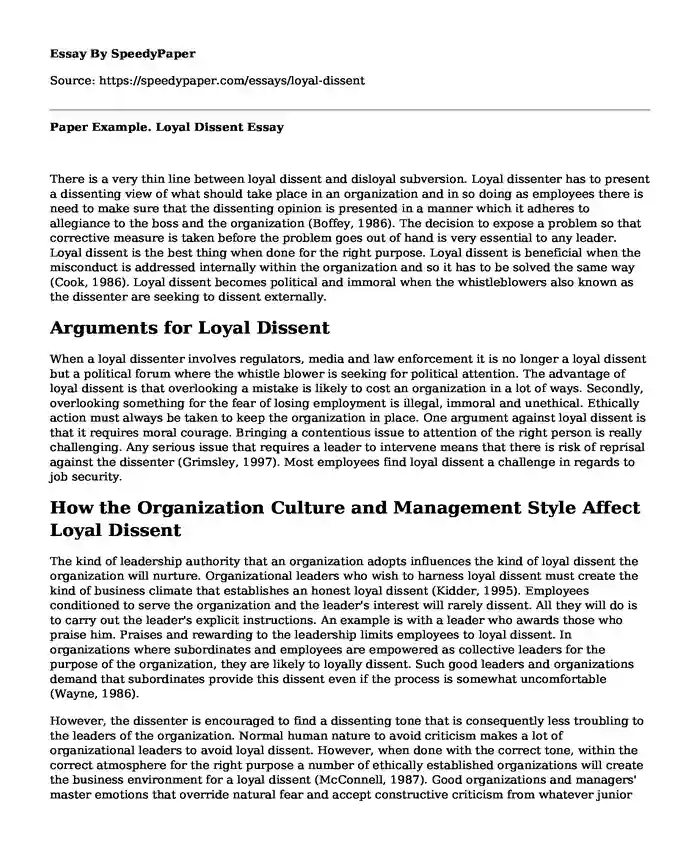
| Type of paper: | Essay |
| Categories: | Human resources Organizational culture Leadership management |
| Pages: | 3 |
| Wordcount: | 756 words |
There is a very thin line between loyal dissent and disloyal subversion. Loyal dissenter has to present a dissenting view of what should take place in an organization and in so doing as employees there is need to make sure that the dissenting opinion is presented in a manner which it adheres to allegiance to the boss and the organization (Boffey, 1986). The decision to expose a problem so that corrective measure is taken before the problem goes out of hand is very essential to any leader. Loyal dissent is the best thing when done for the right purpose. Loyal dissent is beneficial when the misconduct is addressed internally within the organization and so it has to be solved the same way (Cook, 1986). Loyal dissent becomes political and immoral when the whistleblowers also known as the dissenter are seeking to dissent externally.
Arguments for Loyal Dissent
When a loyal dissenter involves regulators, media and law enforcement it is no longer a loyal dissent but a political forum where the whistle blower is seeking for political attention. The advantage of loyal dissent is that overlooking a mistake is likely to cost an organization in a lot of ways. Secondly, overlooking something for the fear of losing employment is illegal, immoral and unethical. Ethically action must always be taken to keep the organization in place. One argument against loyal dissent is that it requires moral courage. Bringing a contentious issue to attention of the right person is really challenging. Any serious issue that requires a leader to intervene means that there is risk of reprisal against the dissenter (Grimsley, 1997). Most employees find loyal dissent a challenge in regards to job security.
How the Organization Culture and Management Style Affect Loyal Dissent
The kind of leadership authority that an organization adopts influences the kind of loyal dissent the organization will nurture. Organizational leaders who wish to harness loyal dissent must create the kind of business climate that establishes an honest loyal dissent (Kidder, 1995). Employees conditioned to serve the organization and the leader's interest will rarely dissent. All they will do is to carry out the leader's explicit instructions. An example is with a leader who awards those who praise him. Praises and rewarding to the leadership limits employees to loyal dissent. In organizations where subordinates and employees are empowered as collective leaders for the purpose of the organization, they are likely to loyally dissent. Such good leaders and organizations demand that subordinates provide this dissent even if the process is somewhat uncomfortable (Wayne, 1986).
However, the dissenter is encouraged to find a dissenting tone that is consequently less troubling to the leaders of the organization. Normal human nature to avoid criticism makes a lot of organizational leaders to avoid loyal dissent. However, when done with the correct tone, within the correct atmosphere for the right purpose a number of ethically established organizations will create the business environment for a loyal dissent (McConnell, 1987). Good organizations and managers' master emotions that override natural fear and accept constructive criticism from whatever junior department it appears from.
Conclusion
It is recommendable to organizations that they create an environment that supports loyal dissent. Such an environment is achieved through democratic leadership (Lindorff, 1986). Once the organization has encouraged a loyal dissent enabled environment, they should also discover ways in which to identify a loyal dissent and a disloyal subversion. In totality, regardless of the technique a dissenter will choose to apply of upmost importance is that the organization and not an individual gain. Loyal dissent actualized through respect and humility within a working system easily resolves a problem. In organizations where juniors and employees are empowered as collective leaders for the purpose of the organization, they are likely to loyally dissent. Encouraging subordinate staffs, and rewarding to the leadership limits employees to loyal dissent, and contributes to enhancing productivity.
References
Kidder, R. M (1995). How good people make tough choices, Harper Collins. New York. pp. 83-88.
McConnell, M. (1987). Challenger: A major malfunction. Garden City, NY: Doubleday.
Boffey, P.M. (1986, February 14. Analyst who gave shuttle warning faults gung-ho, can-do attitude, The New York Times, p. B-4.
Wayne, L. (1986, February 28). Getting Bad News at the Top. The New York Times, pp. D-1, D-4.
Cook, R.C. (1986, March 16). Why I blew the whistle on NASA's O-ring woes, The Washington Post, pp. D-1 to D-3.
Lindorff, D. (1986, June 28). Engineers' Duty to Speak Out. The Nation, pp. 880-882.
Grimsley, K.D., (1997, September 8). A matter of ethics: In the workplace, sometimes you pay a price for following your conscience, The Washington Post, p. F-12.
Cite this page
Paper Example. Loyal Dissent. (2023, Apr 05). Retrieved from https://speedypaper.com/essays/loyal-dissent
Request Removal
If you are the original author of this essay and no longer wish to have it published on the SpeedyPaper website, please click below to request its removal:
- Essay Sample: The Potential Use of Archival Research in Dissertation Writing
- Essay Example on Tourism and the Environment
- Essay Sample: Leadership Role as an Independent Consultant
- Won't You Be My Neighbor: An Analysis of Fred Rodgers' Philosophy of Education and TV Show
- Essay Example about Saudi Arabia Risks and Opportunities Relative to Key Export
- Globalization and Thomas Friedman (Angelina Haugerud). Free Essay
- Free Essay. Conflict Management in Apple Inc
Popular categories




